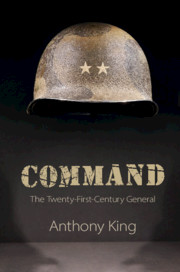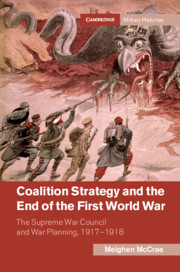Refine search
Actions for selected content:
15418 results in Military history
5 - Twentieth-Century Command
-
- Book:
- Command
- Published online:
- 28 January 2019
- Print publication:
- 31 January 2019, pp 110-153
-
- Chapter
- Export citation
Bibliography
-
- Book:
- Command
- Published online:
- 28 January 2019
- Print publication:
- 31 January 2019, pp 461-478
-
- Chapter
- Export citation
8 - Kandahar
-
- Book:
- Command
- Published online:
- 28 January 2019
- Print publication:
- 31 January 2019, pp 214-248
-
- Chapter
- Export citation

Command
- The Twenty-First-Century General
-
- Published online:
- 28 January 2019
- Print publication:
- 31 January 2019

Coalition Strategy and the End of the First World War
- The Supreme War Council and War Planning, 1917–1918
-
- Published online:
- 24 January 2019
- Print publication:
- 24 January 2019
Additional material
-
- Book:
- Fighting the People's War
- Published online:
- 21 January 2019
- Print publication:
- 24 January 2019, pp xxxiv-xxxiv
-
- Chapter
- Export citation
Maps
-
- Book:
- Fighting the People's War
- Published online:
- 21 January 2019
- Print publication:
- 24 January 2019, pp xv-xxi
-
- Chapter
- Export citation
15 - The Victory Campaigns
- from Part V - Redemption
-
- Book:
- Fighting the People's War
- Published online:
- 21 January 2019
- Print publication:
- 24 January 2019, pp 551-626
-
- Chapter
- Export citation
Appendix 2 - The Morale Reports
-
- Book:
- Fighting the People's War
- Published online:
- 21 January 2019
- Print publication:
- 24 January 2019, pp 702-703
-
- Chapter
- Export citation
7 - Victory in North Africa
- from Part III - Transformation
-
- Book:
- Fighting the People's War
- Published online:
- 21 January 2019
- Print publication:
- 24 January 2019, pp 257-309
-
- Chapter
- Export citation
Abbreviations
-
- Book:
- Coalition Strategy and the End of the First World War
- Published online:
- 24 January 2019
- Print publication:
- 24 January 2019, pp xv-xvi
-
- Chapter
- Export citation
Acknowledgements
-
- Book:
- Fighting the People's War
- Published online:
- 21 January 2019
- Print publication:
- 24 January 2019, pp xxiv-xxviii
-
- Chapter
- Export citation
Contents
-
- Book:
- Coalition Strategy and the End of the First World War
- Published online:
- 24 January 2019
- Print publication:
- 24 January 2019, pp v-v
-
- Chapter
- Export citation
Select Bibliography
-
- Book:
- Fighting the People's War
- Published online:
- 21 January 2019
- Print publication:
- 24 January 2019, pp 861-898
-
- Chapter
- Export citation
Appendices
-
- Book:
- Fighting the People's War
- Published online:
- 21 January 2019
- Print publication:
- 24 January 2019, pp 698-708
-
- Chapter
- Export citation
Part II - The Great Crisis of Empire
-
- Book:
- Fighting the People's War
- Published online:
- 21 January 2019
- Print publication:
- 24 January 2019, pp 95-256
-
- Chapter
- Export citation
Index
-
- Book:
- Fighting the People's War
- Published online:
- 21 January 2019
- Print publication:
- 24 January 2019, pp 899-932
-
- Chapter
- Export citation
3 - Eliminate the Ottoman Empire?
-
- Book:
- Coalition Strategy and the End of the First World War
- Published online:
- 24 January 2019
- Print publication:
- 24 January 2019, pp 64-95
-
- Chapter
- Export citation
Contents
-
- Book:
- Fighting the People's War
- Published online:
- 21 January 2019
- Print publication:
- 24 January 2019, pp vii-x
-
- Chapter
- Export citation
Part IV - The Limits of Attrition
-
- Book:
- Fighting the People's War
- Published online:
- 21 January 2019
- Print publication:
- 24 January 2019, pp 337-470
-
- Chapter
- Export citation
